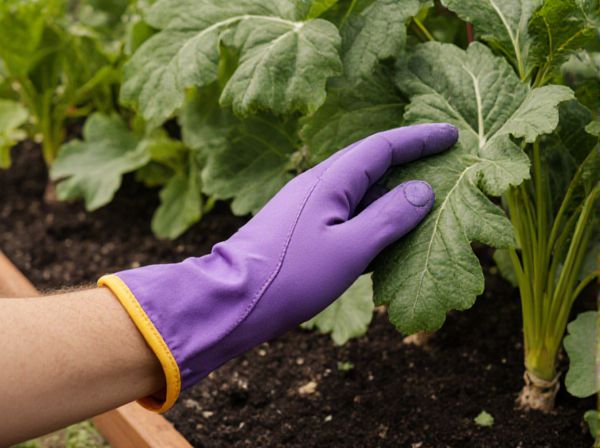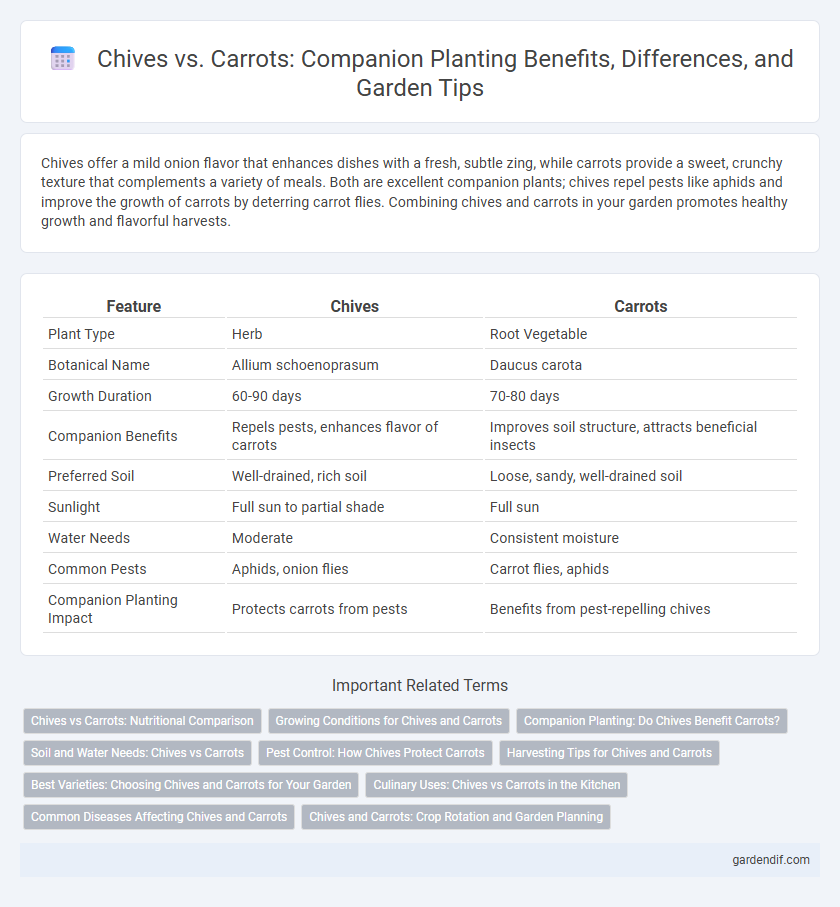
Chives vs carrots Illustration
Chives offer a mild onion flavor that enhances dishes with a fresh, subtle zing, while carrots provide a sweet, crunchy texture that complements a variety of meals. Both are excellent companion plants; chives repel pests like aphids and improve the growth of carrots by deterring carrot flies. Combining chives and carrots in your garden promotes healthy growth and flavorful harvests.
Table of Comparison
| Feature | Chives | Carrots |
|---|---|---|
| Plant Type | Herb | Root Vegetable |
| Botanical Name | Allium schoenoprasum | Daucus carota |
| Growth Duration | 60-90 days | 70-80 days |
| Companion Benefits | Repels pests, enhances flavor of carrots | Improves soil structure, attracts beneficial insects |
| Preferred Soil | Well-drained, rich soil | Loose, sandy, well-drained soil |
| Sunlight | Full sun to partial shade | Full sun |
| Water Needs | Moderate | Consistent moisture |
| Common Pests | Aphids, onion flies | Carrot flies, aphids |
| Companion Planting Impact | Protects carrots from pests | Benefits from pest-repelling chives |
Chives vs Carrots: Nutritional Comparison
Chives provide a rich source of vitamins A, C, and K, along with antioxidants and flavonoids that support immune health and reduce inflammation. Carrots are high in beta-carotene, fiber, and vitamin K1, promoting eye health and aiding digestion. Both vegetables offer unique nutrients essential for a balanced diet, with chives emphasizing micronutrient density and carrots delivering substantial vitamin A benefits.
Growing Conditions for Chives and Carrots
Chives thrive in well-drained soil with full sun exposure and prefer a pH range between 6.0 and 7.0, requiring consistent moisture but not waterlogging. Carrots grow best in loose, sandy loam soil that is free of stones, with a slightly acidic to neutral pH of 6.0 to 6.8, and need cooler temperatures around 55-75degF for optimal root development. Both vegetables benefit from consistent watering, but chives tolerate partial shade better than carrots, which demand more sunlight for strong, healthy roots.
Companion Planting: Do Chives Benefit Carrots?
Chives act as a natural pest deterrent when planted alongside carrots, repelling carrot root flies and aphids that commonly damage carrot crops. Their strong aroma masks the scent of carrots, reducing the attraction of harmful insects and promoting healthier growth. Combining chives with carrots enhances carrot yield and quality through effective companion planting strategies.
Soil and Water Needs: Chives vs Carrots
Chives thrive in well-drained, moderately fertile soil with consistent moisture, allowing their shallow roots to absorb water effectively, whereas carrots require loose, sandy soil that prevents root deformation and prefers slightly drier conditions to avoid rot. Carrots demand deeper irrigation to reach their taproots, while chives benefit from frequent, lighter watering that keeps the topsoil moist but not waterlogged. Understanding these distinct soil textures and watering patterns is crucial for optimizing growth and yield when planting chives and carrots as companion crops.
Pest Control: How Chives Protect Carrots
Chives act as a natural pest deterrent for carrots by repelling carrot root flies and aphids through the strong sulfur compounds in their leaves. Planting chives near carrot beds reduces the risk of infestations, leading to healthier carrot growth and higher yields. This companion planting technique exploits the complementary pest control properties of Allium schoenoprasum to protect Daucus carota crops organically.
Harvesting Tips for Chives and Carrots
Harvest chives by snipping leaves about 1 to 2 inches above the soil to encourage continuous growth and prevent damage to the plant. Carrots are best harvested when their roots reach 1 to 2 inches in diameter, usually 70 to 80 days after planting; loosen soil gently with a fork to avoid breaking the roots. Both crops benefit from harvesting in the cooler part of the day to preserve flavor and texture.
Best Varieties: Choosing Chives and Carrots for Your Garden
Selecting the best varieties of chives and carrots enhances garden productivity and flavor. Garlic chives offer mild, garlicky leaves, while common chives provide a classic onion taste, both thriving in well-drained soil. For carrots, Nantes and Danvers varieties stand out for sweetness and crisp texture, making them ideal companions for chives in herb and vegetable gardens.
Culinary Uses: Chives vs Carrots in the Kitchen
Chives provide a delicate onion-like flavor ideal for garnishing salads, soups, and baked potatoes, enhancing dishes with their mild, fresh taste. Carrots offer a sweet, earthy profile perfect for roasting, pureeing in soups, and adding crunch to salads or stews. Both ingredients contribute distinct textures and flavors, making them versatile staples in diverse culinary applications.
Common Diseases Affecting Chives and Carrots
Chives and carrots both face common diseases such as fungal infections, with chives susceptible to downy mildew and rust, while carrots often suffer from powdery mildew and root rot caused by soil-borne pathogens. Bacterial leaf blight frequently affects chives, characterized by water-soaked spots, whereas carrots are vulnerable to Alternaria leaf blight, leading to dark lesions on foliage. Proper crop rotation and well-drained soil conditions are essential practices to reduce the incidence of these diseases in companion planting.
Chives and Carrots: Crop Rotation and Garden Planning
Chives enhance soil health by fixing nitrogen and repelling pests, making them an excellent companion for carrots in crop rotation and garden planning. Carrots benefit from chives' pest-repellent properties, which reduce carrot root fly infestations and improve overall yield. Rotating these crops helps prevent soil-borne diseases and maintains nutrient balance, optimizing garden productivity.
Chives vs carrots Infographic

 gardendif.com
gardendif.com